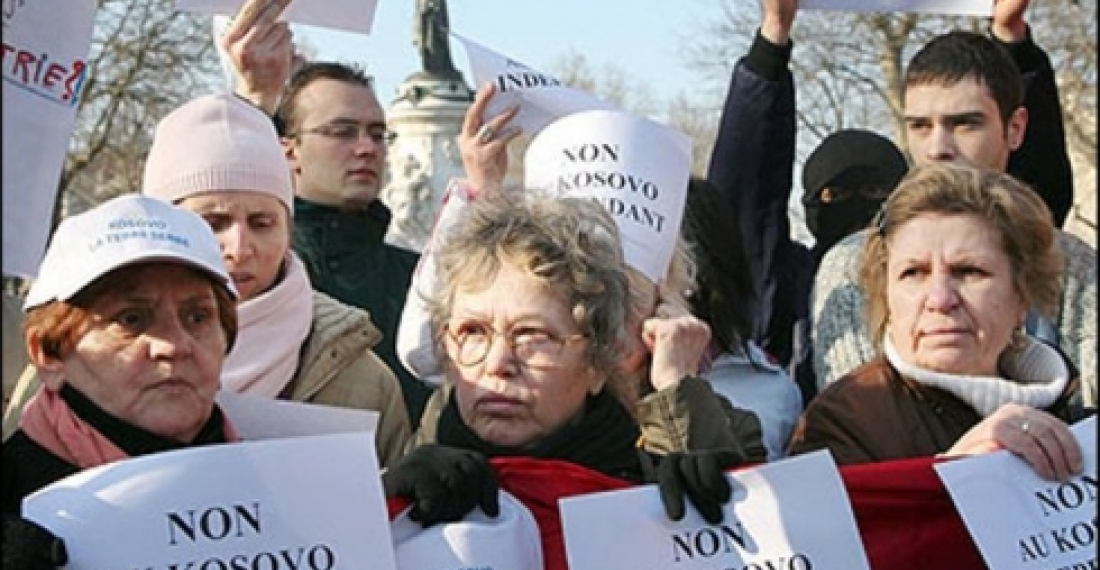Сербия сделала шаг вперед на пути к членству в ЕС в договоре с Косово углубить сотрудничество с бывшей провинцией, независимость которой она не признает. Соглашение, достигнутое вчера в Брюсселе, подписано за неделю до того, как европейские лидеры примут решение на саммите в Брюсселе о предоставлении Сербии статуса кандидата на вступление в ЕС.
Это позволит Белграду начать официальные переговоры о присоединении. Несмотря на то, что лидеры отложили принятие этого решения в декабре прошлого года после сообщении о насилии на границе северных косован, ситуация теперь спокойнее. Сербия была изгнана из Косово силами НАТО в 1999 году после гражданской войны, в которой было убито около 10000 человек.
Новое соглашение устанавливает, что Сербия и Косово согласуют границы. Это дает Косово право на участие во всех региональных совещаниях и подписывать соглашения от своего имени, роль, которая ранее была за миссией ООН в Косово. Обозначение под такими обязательствами будет Косово*. Звездочка указывает на сноску, которая сообщает, что это не наносит ущерба позиции по статусу и находится в полном соответствии с резолюциями ООН и судебной практикой.
Эти соглашения являются важным шагом вперед, заявили представитель ЕС по внешней политике Кэтрин Эштон и начальник и комиссар по политике расширения Штефан Фюле. Эти соглашения особенно приветствуем с учетом обсуждений в [Европейском] Совете на следующей неделе предоставления статуса кандидата Сербии. Большинство государств-членов выступают за предоставление Сербии статуса кандидата, но Германия и другие страны в первую очередь настаивают на улучшение отношений с Косово.
Тем не менее, Берлин смягчает свою позицию. В Белграде на этой неделе, министр иностранных дел Германии, Гидо Вестервелле, приветствовал значительный прогресс, достигнутый с декабря и заявил, что следующим шагом будет статус кандидата. Европейские лидеры также обсудят на следующей неделе должны ли они приступить к технико-экономическому обоснованию для стабилизации и соглашению о ассоциации между ЕС и Косово, который поставит его на путь к членству. Такой шаг в настоящее время имеет сопротивление со стороны пяти стран ЕС, которые не признают независимость Косово: Испания, Румыния, Кипр, Словакия и Греция.
Политический редактор Commonspace.eu пишет в комментарии: "Есть интересные уроки, которые можно извлечь из соглашения между Сербией и Косово, и это может иметь отношение к ситуации и на Кавказе, в том числе вокруг нагорно-карабахского конфликта. Не бывает одинаковых ситуации, но принцип гибкого подхода и акцент на шаги, которые будут выгодны для обеих сторон, это то общее, которое может быть применено к различным ситуациям. Одно из критических замечаний переговоров вокруг нагорно-карабахского конфликта было то, что они слишком узко сфокусированы. Есть проблемы по ситуации в Косово, но это соглашение, безусловно, является шагом в правильном направлении ".
Источник: commonspace.eu по материалам the Irish Times
Фото: Сербы в Париже протестуют против независимости Косово в феврале 2008 года (Фото из архива BBC)
Commentary
Может ли это послужить моделью для Карабаха? Соглашение между Сербией и Косово может содержать пример для ситуации по Карабаху.







